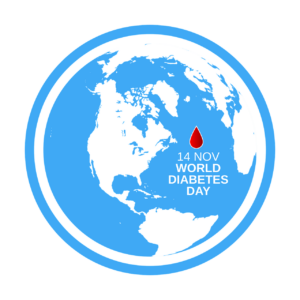World Diabetes Day is marked every year on November 14th in commemoration of Sir Frederick Banting’s birthday since he co-discovered insulin along with Charles Best in 1922. Their discovery has saved countless lives and deserves a day of celebration!

Many of us are affected by diabetes. In fact, 1 in 10 people have it. But what is it? We’re constantly surrounded by talk of diabetes, as well as fear and misinformation about the condition. So, today we hope to reveal some information that may help you or your loved one to understand diabetes and how to prevent or manage it.
Diabetes Awareness: What is Diabetes?
Diabetes is a long-lasting condition that affects how the body turns food into energy. Most of the food we eat is broken down into sugar (also known as glucose) and is sent into the bloodstream. When sugar enters the blood, a little organ called the pancreas makes insulin. Insulin then acts like a key to allow the sugar into each cell in the body to provide energy.
In someone with diabetes, the body either does not make any insulin (type 1 diabetes), doesn’t make enough insulin (pre-diabetes & type 2 diabetes), and/or cannot use the insulin as well as it should (we call this insulin resistance).
When there isn’t enough insulin to allow sugar into the cells, the sugar builds up in the blood. Over time, this can cause serious complications such as heart disease, kidney disease, stroke, and neuropathy (damage to nerves).
Types of diabetes:
Type 1 Diabetes
This type of diabetes is understood to be caused by an autoimmune reaction where the body attacks its own pancreas and destroys the cells that make insulin. In this case, the body quits making insulin. About 5-10% of people with diabetes have type 1. The symptoms usually occur really quickly, and it’s usually diagnosed in children and teenagers. People with this type need to take insulin every day to survive. Researchers don’t currently know how to prevent type 1 diabetes.
Type 2 Diabetes
In those with type 2 diabetes, the body does not use insulin as well as usual. The cells become resistant to insulin (the key that lets sugar inside the cells). This insulin resistance occurs gradually over years and is usually diagnosed in adults. The highs in blood sugar are not immediately life-threatening like they are in type-1 diabetes. So, many people go on living with extreme blood sugar highs and lows and may not know it. It’s important to understand if you are at risk and to have your blood sugar or A1c level tested to know. Type 2 can usually be prevented with healthy lifestyle changes. Keep on reading to see that list!
Pre-diabetes
Pre-diabetes is the stage that is entered before developing type 2 diabetes. There are specific blood sugar numbers that show if you have pre-diabetes. What is scary is that 1 in 3 adults in the US have prediabetes and most of them don’t know it! This raises the risk of getting type 2 diabetes. Luckily, you can still prevent yourself from getting type 2 diabetes! It just takes careful lifestyle and diet changes to reverse it.
Gestational Diabetes
This is essentially like type 2 diabetes that can occur in pregnant women. It doesn’t mean they will have type 2 diabetes for life, but it does increase their risk. If you have had this, it will be extra important to make sure you are following the lifestyle tips below.
Diet & Lifestyle Factors to Prevent/Manage Diabetes:
- Be physically active. Exercise improves insulin sensitivity, which means the cells take up sugar from the bloodstream more easily. Daily exercise will help to keep blood sugar regular. Even going for a 15-minute walk after a meal (especially dinner) will help the cells be more sensitive to blood sugar and prevent risky blood sugar spikes.
- Eat balanced meals. What do we mean by that? A balanced meal has complex carbohydrates (carbs), lean protein, healthy fats, and a good amount of fiber. When consumed together, all of these will slow down digestion and help keep blood sugar in what we like to call the “safe zone.”
- Eat regularly. Eating every 4-5 hours will help keep blood sugar balanced. Skipping meals is harmful to those with diabetes. It can cause risky highs and lows in blood sugar which can lead to damage.
- Avoid sugar-sweetened beverages. Soda, pop, soda-pop, whatever you like to call it, can really raise blood sugar levels. If you need your drink and you have diabetes, we recommend doing a diet soda instead of regular soda. This will help to reduce that constant stream of sugar flowing into the blood.
- Drink plenty of water. Drinking water will keep you hydrated, which is important for everyone to do. It’s especially important for those with diabetes because it dilutes the blood so that the blood sugar isn’t so concentrated. This can help prevent or slow damage to the small veins throughout the body. Plus, those with diabetes are more prone to dehydration in general.
- Maintain a healthy weight. Being overweight or obese is a major risk factor for developing diabetes. If you need to lose weight, figure out a plan and reach out for help if you need it. If you’re already at a healthy weight, continue to keep it. 😊
We hope this information was insightful and that you found something you can do to prevent or manage diabetes. If you feel overwhelmed by the information and you have recently been diagnosed, feel free to reach out and schedule an appointment with one of our registered dietitians.
Information retrieved from CDC.gov.







